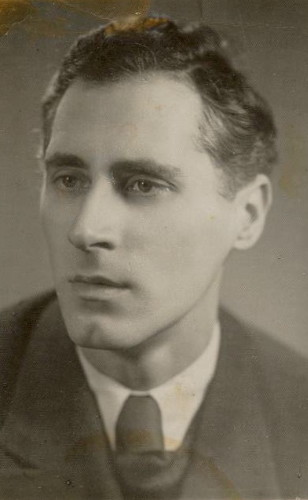Kosach, Yurii
Kosach, Yurii [Косач, Юрій; Košač, Jurij] (Kossatch; pseuds: Ya. Kosarych, H. Roslavets, A. Zhorianych), b 18 December 1908 in Kolodiazhne, Volhynia gubernia, d 10 January 1990 in Passaic, New Jersey. Poet, writer, and dramatist; nephew of Lesia Ukrainka; grandson of Olena Pchilka. After graduating from the Academic Gymnasium of Lviv, Kosach studied law at Warsaw University. He begun publishing short stories in student newspapers in 1927. Between 1928 and 1929 he published most of his works in the nationalist journal Literaturno-naukovyi vistnyk edited by Dmytro Dontsov. Having broken off his relations with Dontsov in 1929, for the next three years he collaborated with the Sovietophile monthly Novi shliakhy edited by Antin Krushelnytsky who also published Kosach’s first collection of short stories Chorna pani (The Lady in Black, 1931). Arrested by the Polish authorities for belonging to a clandestine Ukrainian nationalist organization, he spent a year and a half in a Polish prison. Facing a prospect of another arrest and a four-year term of imprisonment, Kosach illegally crossed the Polish border and escaped to Czechoslovakia. He lived briefly in Prague before moving to Paris. Following a prolific period of literary work in Paris (when he published 10 books of prose and poetry in eight years and had his first play produced), Kosach moved to Berlin at the outbreak of the Second World War. In 1943 he arrived in Lviv and took active part in the city’s Ukrainian cultural life. He was arrested by the Gestapo in Cracow in 1944 and spent several months in a Nazi concentration camp. After the war he lived in displaced persons camps in Germany and was an active member of the writers’ organization MUR. In 1949 he immigrated to the United States. While in New York he initially edited a literary newspaper Obrii; later he published a pro-Soviet journal, Za synim obriiem, which was notable primarily for its strident anti-émigré attacks. Kosach visited Soviet Ukraine several times on official invitation and some of his works, heavily censored by Soviet editors, were published in Kyiv. Only in the 1980s, when his collaboration and official contacts with the USSR ceased, Kosach again managed to produce notable literary works and published three important novels during the last decade of his life.
By far the largest and most interesting body of work is Kosach’s prose, written prior to his emigration to the United States and then in the last decade of his life. Dynamic and with a great emphasis on plot, it consists of several collections of historical novellas and short stories—Chorna pani (The Lady in Black, 1931), Charivna Ukraïna (Enchanting Ukraine, 1937), 13-ta chota (The Settlement of the 13th Platoon, 1937), Klubok Ariadny (Ariadne’s Thread, 1937), Hlukhivs'ka pani (The Lady of Hlukhiv, 1938), and others; as well as novelettes and novels— Sontse skhodyt’ v Chyhyryni (The Sun Rises in Chyhyryn, 1934), Dyvymos' v ochi smerti (We Look Death in the Eyes, 1936), Chad (The Fumes, 1937), Rubikon Khmel'nyts'koho (Khmelnytsky’s Rubicon, 1941), Enei ta zhyttia inshykh (Aeneas and the Lives of Others, 1947), Den' hnivu (The Day of Wrath, 1947), and others. His work weakened in the United States; as his political views changed, he began to write in the style of socialist realism, and was published in Soviet Ukraine. However, in the 1980s he still managed to produce three accomplished novels: a family chronicle Suziria Lebedia (The Constellation Cygnus, 1983), an adventure novel Volodarka Pontydy (Regina Pontica, 1987), and a novel set in the 1930s in Western Ukraine and centered around the plot to assassinate the Polish minister Bronisław Pieracki. Kosach was also the author of several collections of rather average poetry, often marked by his interest in history and mythology. His dramatic works consist of almost twenty plays (some of them lost), including the dramatic poem about Tymish Khmelnytsky Obloha (The Siege, 1943), the tragedy featuring Hetman Yurii Khmelnytsky Diistvo pro Iuriia Peremozhtsia (Play about Yurii the Conqueror, 1947), the drama about Dmytro Bortniansky Skorbna symfoniia (The Sorrowful Symphony), and others.
BIBLIOGRAPHY
Romanov, Serhii. Iurii Kosach mizh mynulym i suchasnym: Istorychna proza pys'mennyka 1930-x rokiv (Lutsk 2009)
Marko Robert Stech, Danylo Husar Struk
[This article was updated in 2015.]
.jpg)
.jpg)

.jpg)
.jpg)
